
Biodynamics part III: cost and controversy
In this third part of our biodynamics series, Westgarth Wines specialist Maurizio Broggi discusses the costs that must be considered in biodynamic viticulture, both financial and moral.
Biodynamic, but at what cost?
Biodynamic farming generally involves higher costs when compared to conventional or organic methods. While estimates vary, some suggest that the expenses of growing biodynamic grapes are between 20 and 30% greater than conventional viticulture.
Labour costs
The biodynamic approach demands a more frequent presence of growers in the vineyard, leading to increased labor requirements. Under-vine weed control, particularly in humid or rainy climates, as well as pest and disease management can necessitate significantly more time and effort in biodynamic viticulture, thereby elevating production costs.
Biodynamic certification
Although winegrowers can practice biodynamic viticulture without certification, winegrowers who want to label their wines as biodynamic must pursue an official biodynamic certification, a process that also involves prior organic certification, further contributing to the overall costs.
The primary certifying body worldwide is Demeter, which establishes international standards for biodynamic farming and animal husbandry. Other notable organizations include Biodyvin in France.
According to Demeter, there are currently over 64,000 acres of vineyards certified biodynamic or in the process of conversion with Demeter, representing more than 1,400 wineries globally, a figure which has more than doubled in the past decade.
Working with nature
Animal husbandry
Biodynamic viticulture emphasizes the integration of animals to increase biodiversity and minimize external inputs. In an era of growing mechanization, the traditional use of farm animals creates a number of cost benefits that machinery cannot; cows provide manure, horses or mules offer traction, sheep assist in weed control, and chickens or geese can help reduce insect pests.
Disease and pest control
In biodynamics, diseases are viewed as indicative of underlying disorders or weaknesses in plants. For this reason, the primary focus of the biodynamic approach is to enhance the natural resistance of vines to pests and diseases.
By cultivating self-sustaining, healthy vines, the potential threat of pests and diseases is reduced. However, viticulture's inherent lack of crop rotation can lead to soil depletion, resulting in weaker vines that are more susceptible to pests and diseases.
Consequently, like with organic viticulture, biodynamic winegrowers must rely on copper-based fungicides, such as Bordeaux mixture, and sulfur sprays to combat fungal diseases.
One of the more provocative defensive practices adopted in biodynamics is known as ashing (or peppering), which involves collecting pests or weeds, burning them, and scattering the ashes in affected areas to deter their return.
A controversial topic
Cosmic rhythms, life forces, planetary alignments, cow horns, deer bladders, dynamization, and ashing, among other peculiar aspects of biodynamics, have generated scepticism among non-practitioners, who often dismiss it as mere esotericism, irrational, or lacking scientific basis.
The proof of the pudding…
Many critics attribute the remarkable results observed in biodynamic vineyards in France to the initial state of the soils, which have likely been severely degraded due to decades of intensive agrochemical farming.
These depleted soils have since been restored to optimal conditions through the efforts of biodynamic growers to improve soil health and microbial life by stimulating biodiversity, hence leading to better soil conditions, healthier vineyards and higher quality grapes.
A common criticism of biodynamics is that the extremely diluted amounts of preparations, such as approximately 100 grams of preparation 500 per hectare, are unlikely to produce any of the claimed beneficial effects.
Critics also argue that the perceived benefits of biodynamics may be primarily attributed to the meticulous attention to detail characteristic of the approach, coupled with the increased time spent in the vineyard by biodynamic growers, which allows for more rapid and effective responses to changing growing conditions.
The trendsetter effect
Several renowned estates worldwide have adopted the biodynamic approach in their vineyards, including Burgundy domaines such as Romanée-Conti, Leflaive, Leroy, and Comtes Lafon, Bordeaux Grand Cru Classés Latour, Palmer, and Pontet-Canet, and other prestigious producers like Chapoutier in the Rhône Valley, Huet in the Loire Valley, Foradori in Trentino, Cayuse in Washington State, and Cullen in Margaret River.
While these prestigious names are associated with biodynamics, viticultural consultant and author Stephen Skelton MW notes in his book "Viticulture" that a relatively small number of the world's greatest wines are currently produced from biodynamic vineyards. Interestingly, many of these producers share common practices with biodynamics such as careful yield restriction, highly skilled labor, and the use of animal manure.
The placebo effect
In his book "The Science of Wine," renowned author Jamie Goode argues that a significant placebo effect may also be at play in biodynamic farming. This can be attributed to the increased scrupulousness demonstrated by biodynamic growers in the vineyard.
The mindset of the grower is a crucial factor in the decision to adopt biodynamic practices as clarified by California trailblazer winemaker Randall Grahm of Bonny Doon who emphasizes that "the most potent tool in biodynamics is the effect it can produce in the practitioner – the ability to see the natural world with more sensitive eyes and the gradual cultivation of powerful intuition."
Want to read more? Take a look at some of our other blogs:
Also in News

An introduction to wine yeasts: Part 2
Cultured yeasts, fermentation styles & the role of the winemaker


